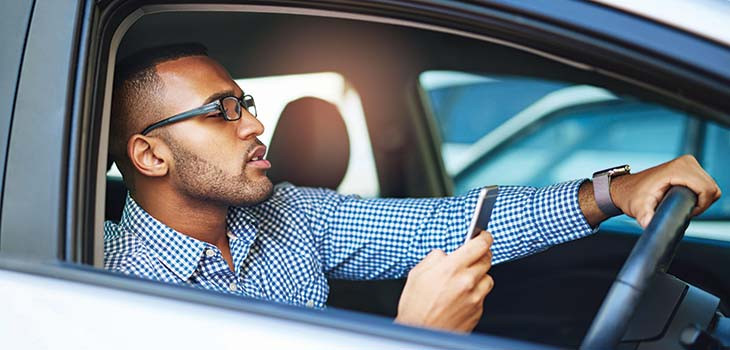
- A look at the changes between the 2003 and the recently amended 2022 legislation for drivers using devices.
- How drivers can still use their mobile phones, and what they should expect if caught driving while using a device.
Since mobile phones have been in existence, there has been a lack of clarity regarding the lawfulness of driving while using a mobile phone. Most people are familiar with the notion that it is an offence to use a mobile phone while driving, but few people are familiar with the Road Vehicles (Construction and Use) Regulations 1986/1078 (as amended).
A recent change in the law provided an opportunity for clarity. While the ambit of the criminal law has been extended; there remains ambiguity as to its application.
The 2003 Legislation
Arguably, it has potentially always been an offence to drive while using a mobile phone. If, as a result of the use of the mobile phone, a driver drove in a way that fell below the standard of a careful and competent driver, they may be liable to be prosecuted for careless driving.
Since 2003, there has been a specific offence relating to the use of mobile phones while driving. Due to the way the legislation was drafted, there was a lack of clarity about when and how using a mobile phone would be unlawful. The law criminalised the use of a mobile phone for the purpose of performing an interactive communication function which was defined as including: the making and receiving of phone calls; sending and receiving messages (or faxes); and accessing the internet.
The 2003 legislation pre-dated smartphones and modern ‘infotainment’ systems, and, therefore, did not specifically address the use of smart phone functions (such as a camera or navigation apps).
The Administrative Court held in DPP v Barreto [2019] EWHC 2044 (Admin), [2019] All ER (D) 28 (Aug) that using the camera function while driving (for example, filming an accident) was not an offence as using the camera function did not amount to an ‘interactive communication function.’ The legislation was further tested in Bendt v Crown Prosecution Service [2022] EWHC 502 (Admin) when the Administrative Court found that using a mobile phone to change music being played over the sound system of a car did amount to ‘interactive communication’, hence it was an offence to do so.
Policy makers realised that it may be difficult to prove to the criminal standard that a driver was using a mobile phone for an unlawful purpose (sending a text) as opposed to a lawful purpose (merely holding the device, using the camera or dictaphone function). Following Barreto, the Department for Transport conducted a review of the legislation and on 25 March 2022, the amended legislation came into force.
The 2022 Legislation
The snappily titled The Road Vehicles (Construction and Use) (Amendment) (No. 2) Regulations 2022 (see bit.ly/3z1uhGC) creates an amendment to Road Vehicles (Construction and Use) Regulations 1986/1078. There are three main changes made by the legislation:
(1) The requirement for a hand held device to be using an ‘interactive communication function’ has been removed. This negates the significance of the Barreto judgment—and means that using the camera (or any other) function while driving is an offence;
(2) There is now a lengthy (but not exhaustive) list of defined activities which amount to ‘using’ a handheld device. These are:
(i) illuminating the screen;
(ii) checking the time;
(iii) checking notifications;
(iv) unlocking the device;
(v) making, receiving, or rejecting a telephone or internet based call;
(vi) sending, receiving or uploading oral or written content;
(vii) sending, receiving or uploading a photo or video;
(viii) utilising camera, video, or sound recording functionality;
(ix) drafting any text;
(x) accessing any stored data such as documents, books, audio files, photos, videos, films, playlists, notes or messages;
(xi) accessing an application;
(xii) accessing the internet.
(3) A specific exception has been made for a person to use their mobile phone to make a contactless payment (when stationary) for the purpose of purchasing goods or services which are provided at the time or after the contactless payment is made.
Analysis
The amended legislation remains difficult to read and understand.
Nevertheless, the practical effect of the legislation is to criminalise the holding of a hand-held device while driving. If caught, a driver can expect to receive a fixed penalty notice for six penalty points and a £200 fine or be prosecuted.
The change in the law will also make it much easier for prosecutors to be able to prove their case as it has removed the lacuna in the legislation which was highlighted in Barreto.
As the legislation is framed around the use of ‘hand-held’ devices, it will not be a specific offence to use devices held in a cradle, such as an infotainment system or a mounted mobile phone. The legislation does not make this clear, but the government guidance confirms that it is permissible to use the following hands free devices:
- ‘a Bluetooth headset;
- voice command;
- a dashboard holder or mat;
- a windscreen mount;
- a built-in sat nav.
The device must not block your view of the road and traffic ahead.’
While it makes sense to permit the use of mounted devices the new law does create some anomalies. For example, it could be lawful to use a mounted infotainment system to make a mobile phone call while driving at 70 miles per hour on the motorway, but it would be unlawful to pick up a mobile phone to check the time while stationary in traffic.
In Barreto, the Administrative Court was critical of the way the old legislation had been constructed. It is regrettable that the government did not repeal the existing legislation and create a clearer, single piece of legislation which criminalised the mischief in question.
Nick Dent, managing associate, Mishcon de Reya LLP (www.mishcon.com).










